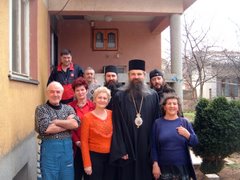Raskovic-Ivic Comments Were Taken Out of Context
Kosovo: What status will it have?
Regnum
August 21, 2006
The discussion of possible Kosovo status scenarios has been given a new impulse by the recent BBC report that during a recent interview the head of Serbia’s Coordinating Center for Kosovo-Metohija Sanda Raskovic-Ivic pointed out that Serbia’s position on the issue remains the same: Serbia is ready to provide Kosovo with a substantial autonomy. At the same time, Raskovic-Ivic said that should both sides, Serbians and Albanians, admit that they cannot co-exist and should the international community recognize this fact, some scenario of Kosovo division might be a solution for both sides.
This was her personal opinion, but, once reported by BBC three days later, it got into the world press editorials. In fact, we all know that the basic Kosovo status principles formulated by the Contract Group clearly say that there must be no Kosovo division. Then how should we take the words of Raskjovic-Ivic?
The BBC report has been severely criticized by Serbian officials. The head of the PR Department of the Coordinating Center for Kosovo-Metohija Jivanov says that the words of Raskovic-Ivic have been picked up from the general context of her big interview about the life conditions of Serbs in Kosovo, about the crimes committed there and about the recent talks between Serbian and Kosovo Albanian delegations. (By the way, the interview was given 10 days ago but has not been published to date). As a result, says Jivanov, it now looks as if she said that Serbia has renounced its position on substantial autonomy for Kosovo, which is not so.
The spokesman of the ruling Serbian Democratic Party Mladenovic says that the words of Raskovic-Ivic have been misinterpreted. In fact, in her interview she mentioned two types of autonomy: Kosovo within Serbia and Serbs within Kosovo. Raskovic-Ivic said that substantial autonomy for Kosovo within Serbia is the best and the only solution – a compromise that can give results for the future co-existence of Serbs and Albanians in the territory of Kosovo-Metohija. Mladenovic believes that Raskovic-Ivic would be the last to renounce this position.
A day after the interview of Raskovic-Ivic, Serbian Interior Minister Dragan Jocic said that Serbia will not allow Kosovo’s secession.
We would like to note that the idea of Kosovo division is not new. It was mentioned by both the killed Serbian Prime Minister Zoran Djindjic and, even earlier, by the first President of Yugoslavia Dobrica Cosic. They meant annexing the northern part of Kosovo to Serbia (15% of its territory) and establishing border along the river Ibar. Now, says Glas Javnosti daily, there might be another compromise scenario: not dividing Kosovo formally, but forming a Serbian autonomy and several Serbian enclaves in its territory — almost like Bosnia and Herzegovina, which is not divided formally but, in fact, is divided ethnically.
In Serbia Raskovic-Ivic’s words have received mostly negative response. The Forum for Security and Democracy believes that the territorial division of Kosovo is dangerous, first of all, for Serbia: “The Kosovo division ideas are good for the Albanian extremists. In fact, this would destabilize the situation in the whole region, especially, in the southern part of Central Serbia, as, if held, the division talks would involve this region too in the Kosovo settlement package.”
However, Serbian mass media report local observers to say that there is a reserve scenario – an alternative to the unreal “wide autonomy within Serbia.”
The Kosovo Serbs also object to the Kosovo division scenario. The leading Serbian deputy candidate in Kosovo Ivanovic says that this is a deeply erroneous concept. It does not reflect the position of the whole Serbian delegation and can be just a personal viewpoint. He calls a catastrophe the idea to present Kosovo division as a compromise between Albanians and Serbs. The head of the Deputy Group of the Serbian ticket Nojkic says that the division idea is applicable for the northern – mostly Serbian — part of Kosovo, but cannot resolve the whole Kosovo problem. Janic from the Forum on Ethnic Relations says that such a scenario would be a real misfortune for the Serbs, 2/3 of whom live southward of the possible demarcation line, and would make possible one more ethnic cleansing. The Executive Committee of the Serbian National Veca of Kosovo says that it strongly objects to any division of the region as this is contrary to the Serbian national and state interests.
Albanian politicians are quite categorical on the matter: the idea of Kosovo division is unacceptable. Kosovo will accept only its independence with right protection guarantees for minorities.
The West, judging from its last actions to enhance the presence of international security forces in Northern Kosovo, is also against division. At the same time, some Western political experts have appeared with quite noteworthy views. British publicist Tim Judah believes that Kosovo division is not realistic, but still notes that some diplomatic circles are considering the idea of dividing Kosovo along the river Ibar or giving its northern part some special status. He says that the statements of Raskovic-Ivic were a kind of “ballon d’essai” – they just want to see the public reaction. US professor Charles Kupchan says that Kosovo will not be divided as the international community would hardly like to open Pandora’s box in the south of Serbia. Now that there is no way for bringing the positions of Serbia and Kosovo Albanians any closer, the international community has just one way left: to impose its own solution — something that may well be good for the Serbian authorities, for whom the voluntary recognition of Kosovo’s independence would be a political suicide.
What status should Kosovo have? Today, this is one of the most difficult questions for the international community. Much may become clear after the September 2006 meeting of the UN Security Council. Keeping this in mind, the Serbian Foreign Ministry, while welcoming the UN SC’s recent resolution on the Middle East crisis, says that it hopes that they will be consistent in their attitude towards the Kosovo status and will not support the bellicose demands of the extremists.

















